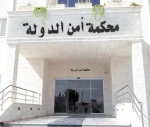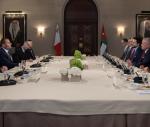You are here
Activists discuss gender stereotypes in school textbooks
By Dana Al Emam - Feb 05,2015 - Last updated at Feb 05,2015

SALT — School curricula for the elementary level must be revised to address conscious and unconscious stereotyping against women and to further highlight their contributions to public life, according to a field expert.
At a recent workshop on gender analysis of school curricula, Wafa Khadra, assistant professor at the American University of Madaba, presented her research on the role of Arabic and civic education curricula for grades one to six in the formation of students' identities.
Khadra noted that one's identity is "fluid with a possibility to change according to ideological and cultural settings", noting that school curricula largely contribute to the formation of students' identities.
She added that the depiction of gender in school textbooks establishes for negative stereotyping against women and portrays them as "the absent ones".
The professor said the exercises in the books, which are supposed to transfer cognitive skills into a value system that translates into behaviour, exclude females from that process.
“Activities in these books do not address female students at all,” she said at the event, organised by the USAID Takamol-Gender Programme, adding that the only character consistently depicted in the textbooks is a boy with a football, a persona that only male students can relate to.
“The naturalisation of silencing women in activities is not spontaneous,” she noted, calling for “capitalising the Education Ministry’s attempts to include women as charismatic leaders” throughout history and in the contemporary world.
The scholar cited several examples from the books on the misrepresentation of women, including limiting their roles to the domestic sphere as housewives, with an irregular and "fragmented" presence in the public sphere; only as teachers or nurses.
She said that the books under study include up to 10 professions for women, all within a single dress code, while males are represented in over 120 professions, most of them related to building and protecting the country.
Men were superior in the binary opposition (male/female) in statements and questions at all times, except when the context is that of charity and services, Khadra said at the event, which was held at the Institute of Hospitality Training in Balqa Governorate's Salt city.
She highlighted a "pattern" of linking incorrect behaviours and practices to red, which symbolises femininity, in a way that associates women with danger and impropriety, while correct and approved practices are linked to blue.
Meanwhile, Kafa Akroush, head of the gender unit at the Education Ministry, said the ministry had trained some of its staff members only on "selected" gender-related concepts, due to "fears" of the topic's "sensitivity".
She added that almost each of the ministry's 42 directorates includes three employees trained on gender issues who work on collecting "qualitative indicators" from students, teachers and principals regarding gender issues.
"However, these employees need comprehensive training sessions that deepen their knowledge on the topic and tackle methods of introducing gender sensitisation to national curricula," Akroush said.
Commenting on the USAID-funded project, Takamol Chief of Party Nermeen Murad told The Jordan Times that it seeks to work with all sectors and local partners to increase awareness of gender-based equity and meet the priorities of Jordanian women.
Murad added that the project, which started in May 2014, is implemented in five sectors: creating online and offline social dialogues; advocacy towards developing equal gender-based employment opportunities; creating research-based knowledge; developing capacities; and monitoring gender-related policies.
She noted that regional unrest has greatly affected women as conflicts have resulted in displacing them.
Turbulent political conditions have also created a "conservative attitude" around the region, which extends to Jordan, causing a "regression", especially with claims that the gender narrative is Western in origin, "but it is not".
"A woman's right to be treated like others is granted in Islam and Christianity," she said, noting that Westerners might have been the ones to create the gender-related terminology, but "we should not be scared to claim these rights as ours".
Related Articles
AMMAN — The highlights of a USAID-funded programme that seeks to mainstream gender within society took centre stage at a recent event, revie
AMMAN — Starting Thursday, researchers can access the Takamol HAQQI Gender Clearing House platform for information on legislation, research
AMMAN — Women groups on Wednesday called for establishing a women’s parliamentarian committee to address the growing challenges women are fa















